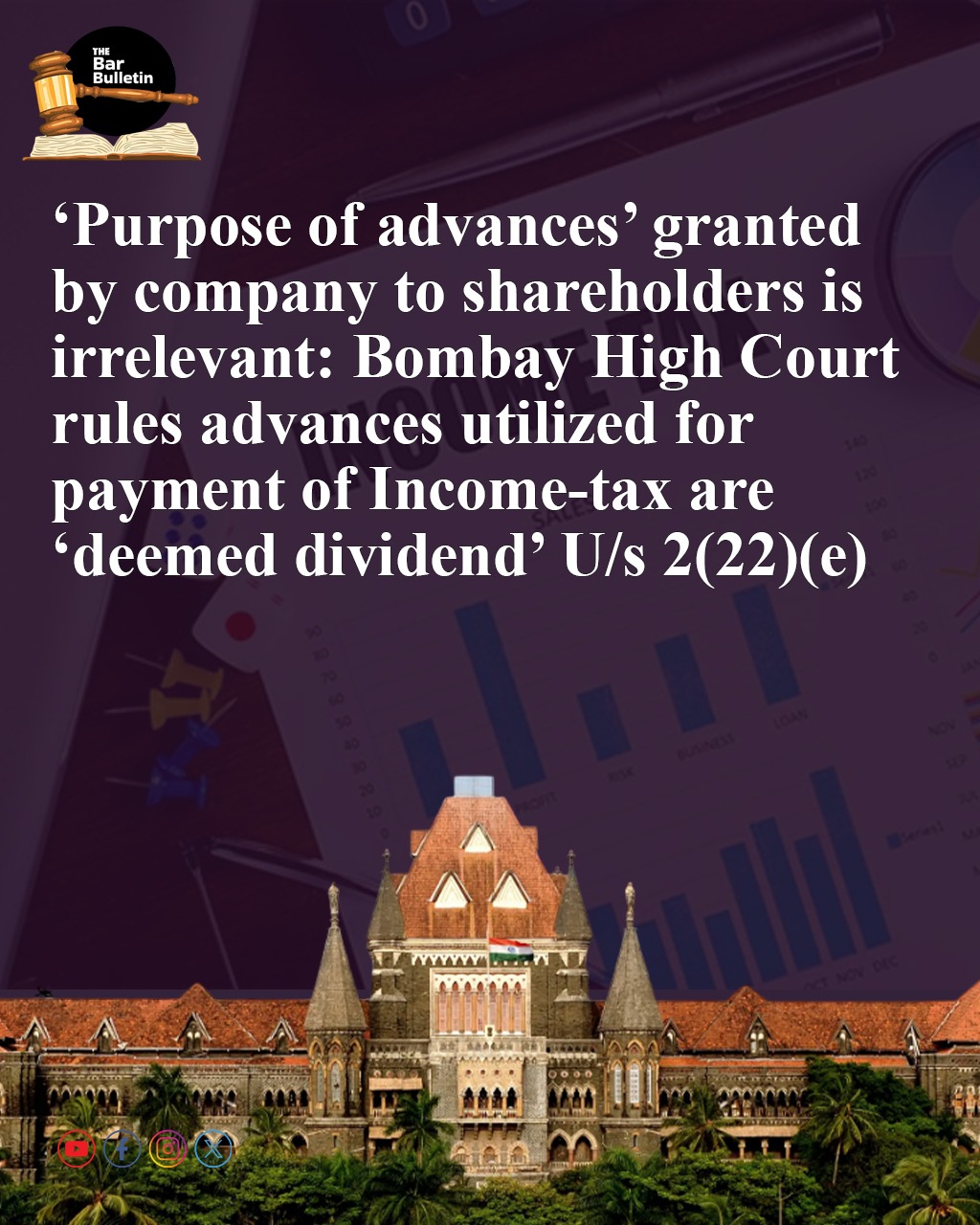The Bombay High Court has recently held that a business advance granted by a company to its shareholder, who does not actually utilize the said advance for the execution of job work for the company, has to be treated as a deemed dividend under Section 2(22)(e) of the Income Tax Act. The Court clarified that even though the business advance of Rs. 71 lacs against pending orders was repaid within two months, the fact that the Appellant has admittedly utilized the advances for payment of Income-tax under the Kar Vivad Samadhan Scheme (KVSS), the Income Tax Department has rightly treated the amount of the said advance as deemed dividend under provisions of Section 2(22)(e).
Referring to a CBDT Circular No. 19/2017, which provided that the trading advances in the nature of commercial transactions would not fall within the ambit of ‘deemed dividend’ u/s 2(22)(e), the Division Bench comprising Chief Justice Alok Aradhe and Justice Sandeep V. Marne observed that utilization of advance for execution of a particular business transaction is a sine qua non for exclusion of the amount of loan or advance from the ambit of Section 2(22)(e). The Bench clarified that the real key is not the purpose for which the advance is made, but rather, it is the purpose for which the advance is utilized, and it needs to be demonstrated by the sister concern or shareholder that the advance made for a business transaction is actually utilized for the execution of such business transaction.
Speaking for the Bench, Justice Sandeep observed that all the ingredients of Section 2(22)(e) stand satisfied in the present case, as there are concurrent findings of fact recorded by all the Departmental Authorities as well as the ITAT that the amount of advance was not utilized by the Appellant for execution of any job work for GPIL, but rather utilized the amount of advance for payment of Income-tax under the KVSS, and therefore, dismissed the appeal in favour of the Revenue Department.
Briefly, the Appellant (taxpayer) was the Managing Director and a substantial shareholder in Ghatge Patil Industries Limited (GPIL), which is a company engaged in the business of manufacturing castings and other components. He had a running account with GPIL, and there were continuous business transactions between the Appellant and GPIL. In furtherance of an order received by GPIL from TELCO exceeding Rs. 9 crores, the value of machining charges and castings to be supplied by the Appellant to GPIL was to the tune of Rs. 5.66 crores, and the total value of orders already placed by GPIL with the Appellant was to the tune of Rs. 1.18 crores. Since the value of orders outstanding was Rs. 73.58 lacs, the Appellant requested an advance from GPIL against pending expected orders, out of which GPIL gave an advance of Rs. 71 lacs. However, TELCO did not go ahead with the orders placed with GPIL, resulting in the cancellation of the transaction. The Appellant therefore returned the advance to GPIL in the same financial year. The AO, however, while making assessments, treated the said advance as deemed dividend u/s 2(22)(e) and brought the same to tax in the hands of the Appellant. This assessment was confirmed by the CIT(A) as well as the ITAT, resulting in an appeal before the High Court.
Cases Distinguished:
CIT vs Creative Dyeing and Printing P. Ltd. – [2009] 318 ITR 476 (Delhi)
CIT-I, Ludhiana vs Amrik Singh – [2015] 231 taxman 731 (P&H)
CIT vs Raj Kumar – [2009] 318 ITR 462 (Delhi)
CIT vs Deepak Vegpro Pvt Ltd. – [2018] 406 ITR 496 (Raj)
CIT vs Ambassador Travels P. Ltd. – [2009] 318 ITR 376 (Delhi)
CIT vs Atul Engineering Udyog – [2015] 228 Taxman 295 (Allahabad)
Appearances:
Advocates R. S. Padvekar, Tanzil Padvekar, and Tejal P. Kharkar, for the Appellant/ Taxpayer
Advocate Arjun Gupta, for the Respondent/ Department



